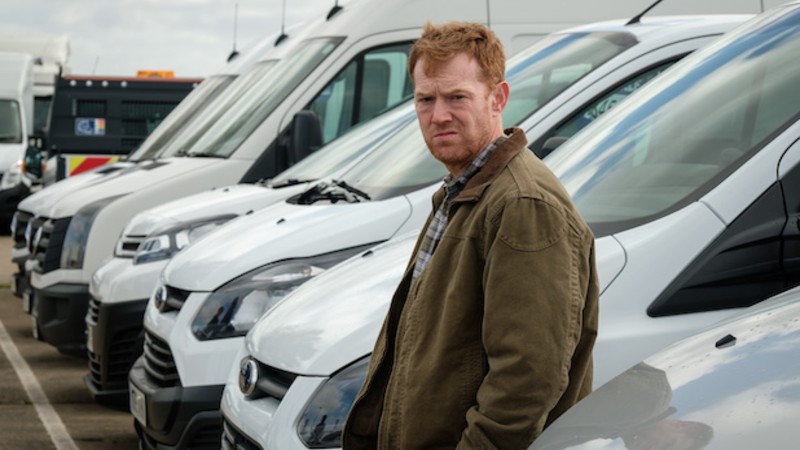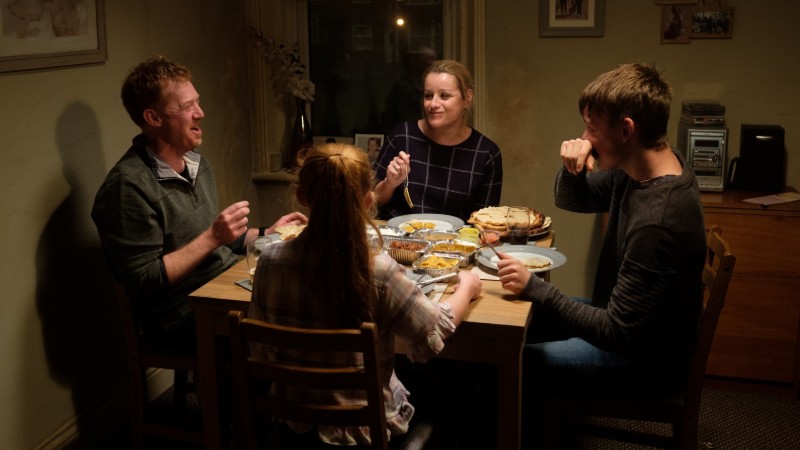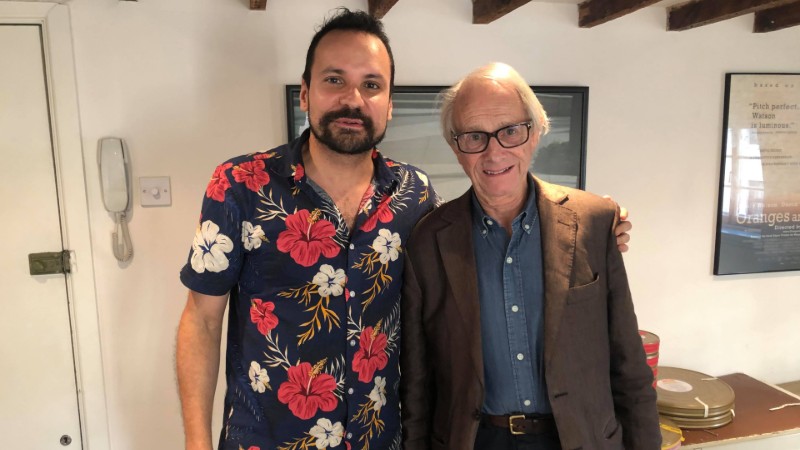Ken Loach remains the most prominent and virtually unchallenged voice of the working class in British cinema. His latest movie Sorry We Missed You is an extremely powerful statement about eroding working conditions in modern-day Britain. Our editor Victor Fraga believes that it is even more excruciatingly painful to watch (and therefore even more effective) than its companion piece from three years ago I, Daniel Blake, which won the Palme d’Or in Cannes. That’s because audiences are forced to walk in the shoes of the oppressed working man.
In Sorry We Missed You, Ricky (Kris Hitchen) is a building worker with an impeccable CV, living with his family somewhere in suburban Newcastle. He persuades his wife Abbie (Debbie Honeywood) to sell off her car so that he can buy a van and move into the delivery industry. A franchise owner promises Ricky that he’ll be independent and “own his own business”, and earn up to £1,200 a week. The reality couldn’t be more different. Ricky ends up working up to 14 hours a day six days a week. His draconian delivery targets turn him into a delivery robot. Ricky has been conned. His “independence” is but an illusion. Click here in order to read the review of the movie.
Our editor sat down with Ken in order to understand the challenges that Ricky and the working class in the UK, Europe and the rest of the world face, and what we can do in order to overcome their apparently insurmountable barriers. They also discussed modern-day slavery, Jeremy Corbyn, Brexit, free movement and how British movies have helped the far-right to disseminate prejudices and fake patriotism!
Sorry We Missed You is in cinemas on Friday, November 1st!
…
.
Victor Fraga – Four million working people are currently living in poverty in the UK. That’s four million Rickies and Abbies? How have we failed so many people?
Ken Loach – That’s actually 14 million. One-four [in reality, this is the total number of people living in poverty, not just workers living in poverty]. Four million of those are children. And 1.5 million are in dire poverty. That means that they don’t have the means to the essentials of life.
It’s a process that began with Margaret Thatcher. She destroyed communities in the old working-class areas, with mines and factories being closed. Those were the old days of the secure job, with the eight-hour day and the 40-hour week, a wage on which you could bring up a family and have somewhere to live, have a holiday without losing money. Those working conditions were gradually eroded under the pressures of harsh competition from big companies, because they have to compete on both quality and price, so those who get the trade will be cheaper. They have to cut their labour costs. And they do that by finding new ways to employ people. They don’t pay holiday pay, they don’t pay sick pay. They have no responsibility for the worker beyond their day’s work. They can hire and fire them very easily. So they work through agencies, which also have no responsibility for the worker. They are so called self-employed. The bogus self-employment.
The work in this case, he [Ricky from Sorry We Missed You] is simply providing a service. He’s just a worker providing a service. Therefore they don’t need to obey trade unions rules, they don’t need to pay the minimum wage. It’s just a contract to supply a service. That of course isn’t true, because the driver is entirely contracted to this one company, and they are to all effects and purposes one worker. But this new form of words for the same job means the employer has no responsibility.
VF – Who changed the words?
KL – Employers found clever new strategies. They are market-orientated people who find their way around the rules. The minimum wage doesn’t apply to someone who’s providing a service. So a driver might work 12 hours a day or more and still struggle to make a decent living. The eight-hour day, the minimum wage and the guaranteed working week have been swept away by the gig economy.
It’s a logic. If you are committed to the free market, that’s based on competition. Firms compete on price, therefore they must continue that exploitation, otherwise they are going to lose trade.

VF – We’re seeing far-right and ultra neo-liberal governments destroy working rights around the world. I’m from Brazil, where the phenomenon is more pronounced yet not entirely dissimilar to the UK. Is the erosion of working rights the natural and inevitable consequence of capitalism, or is this just a perverse subversion of capitalism?
KL – I think it’s an inevitable consequence of free market capitalism. Because, as I say, it’s based on competition and therefore they will try to cut their labour costs and increase exploitation. That’s the only way they can do it. And now they use technology in order to do it. So Ricky as a driver, he doesn’t have someone over him telling him he has to work harder. He’s got a machine in the car which knows where he is every two minutes. It beeps if he’s out of the car for more than two minutes. It allows him no time to go to the lavatory. No time for a break. He’s driven by a piece of electronic equipment. He’s forced to exploit himself. And when the worker has to exploit himself, that’s the ideal situation for the employer.
VF – I would argue that we saw improvements in working conditions in the 20th century. And we’re now going back to Victorian times, or even the industrial revolution. Do you agree?
KL – Absolutely. I think that there was a real change in consciousness after WW2, the public good was something that we all subscribed to. Trade unions grew stronger, and therefore workers’ rights grew stronger. The trade unions had the negotiating strength to get the eight-hour day, to get a decent wage. Collective bargaining is the strength of the working class. And that’s what Thatcher aimed to destroy. And to a large extent she succeeded. Partly because the labour movement itself, and the Labour Party, didn’t put up a good enough fight.
What’s much remarkable about this time right now is that with Jeremy Corbyn and John McDonnell, it’s the first time in 100-year history that the Labour Party has a leader of the left. And that leadership will stand for the interests of the working class. Blair stood with business. Corbyn will stand with workers, and that’s why he’s so attacked.
VF – The working conditions in Sorry We Missed You are comparable to slavery. The British Empire was built upon slavery. Have we found a surrogate for old-fashioned colonialism whereby we oppress our very own workforce?
KL – I wouldn’t use the work slavery. It’s too glib. Colonialism has been replaced by the working class of countries were the wages are even lower than they are here. Getting clothes from Bangladesh is a form of colonialism, because we are using their very exploited working class for goods to sell here. When capitalism goes global, the trade goes to those on starvation wages. It’s a race to the bottom. And we know that the working conditions in some Eastern countries are atrocious.
VF – Abbie knows unfettered solidarity and devotion to her job. But she pays a price for that. Has solidarity become unfeasible or even illegal?
KL – They have tried to nullify it, and that’s a challenge for the left. Solidarity needs political intervention. And obviously we need strong trade unions. But in order to get strong trade unions we need a party in power that will restore their powers, which Thatcher took away. A party that will make zero-hour contracts illegal. There has to be some commitment to the working week. Otherwise the minimum wage is meaningless. There also has to be an end to bogus self-employment. And there’s yet another change that we must deliver. Not long ago our post office was nationalised. And was always a public service. We owned it. Then the Tories privatised it, and now we need to bring it back into public ownership, so that parcels are delivered by the postman. That cuts out this need to rip-off delivery companies.
The system pits people against each other. The fastest driver gets the best route, which means they will earn more money. They consciously put one driver against another. That’s what Paul Laverty’s [Loach’s screenwriter for nearly three decades] found in his research. And that’s another reason why this bogus self-employment should end.
VF – Will Ricky be better off in post-Brexit Britain? Will he enjoy more or will he enjoy less labour protections?
KL – This bogus self-employment is happening while we are in the European Union, and it will get worse if Boris Johnson and the Tories are in power when we leave. Brexit is a distraction. Because the big issues – poverty, exploitation and failing public services – are being neglected. For the left, it’s a tactical question.
VF – Let’s say Jeremy Corbyn gets to power. Do you think Ricky will be better off -in a post-Brexit Jeremy Corbyn government?
KL – That depends on the deal. They haven’t negotiated the deal yet. I would hope that a Labour government under Corbyn would negotiate a deal whereby we have control over our fisheries, so that we can protect the fish stock, and we have control over agriculture, so we can control the ecological side. And we would improve on workers’ rights by ending zero-hour contracts and bogus self-employment. We would bring public services entirely back into public ownership. Not outsourced. That might be against EU policies of competitive industry, their rules of what the state can do in terms of intervention. They think that’s against competition.

VF – But aren’t some public services nationalised in the largest EU countries, such as the trains in France and Germany?
KL – Yes, they are, but that’s a tension within the European Union. The European Union’s founding document is based on the free market. So those examples are an anomaly in the practice and in the rules. If you look at the rules, they oppose state intervention if it interferes with competition. I would argue that a Labour government needs to intervene in competition in order to provide a better service and protect workers’ rights. It depends on the deal that Corbyn gets, if he gets elected. If the deal is a good deal Ricky would be better off outside the EU. If the Corbyn deal is not a good deal, he’d be better off inside the EU. It’s a judgement you can only make once you see the deal Labour has negotiated.
VF – What about free movement and diversity? If we close our borders and no EU people can come in, would that have a positive impact on Ricky’s life?
KL – In principle, you have to be in favour of free movement. But I think that in order for free movement to be really free – not a means of an employer getting cheap labour – the economies have to be roughly equal. Because if the wages are lower in one group of countries, people will migrate to where the wages are higher. And that’s what happened. And that can produce problems of racism, because the local people feel undermined in their income. In order to avoid that, there should be a conscious move to equalise the economies. People can travel, freely, but they can have a good living in their own country. Free movement has to go alongside equalising the economies.
VF – But that’s going to take a long time. Wages in Romania won’t be on the same level as Britain in 10 or 20 years. Does that mean we should close our gates for now?
KL – No, I think that we need to work with poorer countries so that their young talent don’t go abroad to work in coffee shops because the wages are higher. But equally, that’s got to be done with planning and agreement, not with one country putting up barriers.
VF – Fake patriotism and nostalgia of imperialism are more rabid than ever, with the ultra-nationalistic Brexit Party coming first in the latest EU elections. How can cinema help to fend off this dangerous and reactionary threat?
KL – Yes, I agree with you that there’s a lot of fake patriotism, xenophobia, chauvinism. I think that cinema and the left in general should communicate that people are of equal value, whatever their origin, religion, the language they speak. Everyone is our neighbour. Our working class people have more in common with the working class of other European countries than with our ruling class. We’ve taken Sorry We Missed You to Spain, France, Germany and Ireland so far, and everywhere it’s the same story. When you show it to an audience in France you realise that delivery drivers here have exactly the same situation as delivery drivers in the rest of Europe, and they have nothing in common with Boris Johnson’s ruling class.

VF – I think that a lot of mainstream cinema has helped to stir fake patriotism and anti-European resentment, and some films are Brexit’s BFF, such as Dunkirk (Christopher Nolan, 2017) and Darkest Hour (Joe Wright, 2018). They are a manna from heaven for people like Farage. Do you share my view?
KL – Very much so. We had so many war films after the War where all the Germans were bad, except there was one nice German. That’s where the phrase “the good German” passed into common usage. The message of these films was: “Germans are bad”. The German language became associated with Nazis, even though the British governments were happy to support the fascists in Spain under Franco. Churchill was a rabid imperialist. We supported dictators and the far-right around the world. Same with the States. So came the phrase: “he might be a bastard, but he’s our bastard”. So let’s not take any lessons from the far-right and their patriotism, because the interests of the working people are the same anywhere in the world.
VF – Does mainstream cinema tend to have a subliminal far-right message?
KL – Yes, absolutely. The classic message of the American cinema is: “one man with a gun will sort your problems”. It’s not about solidarity.
VF – What about British cinema?
KL – I don’t know much about British cinema, to be honest. It may seem strange.
VF – It does seem very strange!!!
KL – That’s true. The British war films that I grew up with were always about the “good Brit” versus the “bad German”. Or the coward Italian. They were all stereotypes.
VF – You made a documentary entitled In Conversation with Jeremy Corbyn (2016), yet there doesn’t seem to be much positive coverage of the Labour leader elsewhere. Do you believe that the British media – even the left-leaning papers such as The Guardian – are biased against Jeremy Corbyn, is there a smear campaign, and has that impacted how your documentary was received?
KL – It was a just short film, it never really had a major presence, so I wouldn’t say I encountered resistance.
I spoke to Jeremy very little about this. So this is just my opinion. The right wing and the centre press – the Guardian included (which I don’t see it as a left wing newspaper) the BBC, ITV and so on – certainly have to varying degrees opposed Corbyn. The only paper that supports him is The Morning Star, but the others won’t even acknowledge its existence. There is a smear campaign against him, there is a campaign to undermine and to ridicule him. And key to that are the Labour MPs, the majority of which came to power when Blair was the leader, so they are right wing Labour MPs and their task is to undermine Corbyn. They are the biggest danger we face.
The picture at the top and at the bottom and of this article are of Ken Loach and Victor Fraga on the the day this interview was conducted. The other images are stills from Ken Loach’s latest film Sorry We Missed You.















